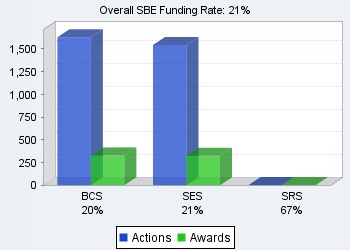|
Strategic Plan Prepared for the Geography and Spatial Sciences (formerly Geography and Regional Science) Program Following a series of iterations over recent years, former Geography and Regional Science program officers and other NSF officials have developed a Strategic Plan for what is now named the Geography and Spatial Sciences Program. The strategic plan can be accessed via this link. Implementation of recommendations in the strategic plan, including the formal renaming of the program, started in the latter part of February 2009. GSS program officers expect the functional implications of this change to be minimal for investigators who are submitting proposals to the program or who have awards managed by the program. Questions or comments regarding the strategic plan may be directed to the GSS program officers: Thomas Baerwald (tbaerwal@nsf.gov, 703-292-7301); Scott Freundschuh (sfreunds@nsf.gov, 703-292-4995); and Kenneth Young (kryoung@nsf.gov, 703-292-8457). A Unique Panel Data Set Just Released: A Rural Indigenous Population in the Bolivian Amazon Integrating to the National and International Market Economy The Tsimane' Amazonian Panel Study (TAPS) has just released a unique annual panel data set 2002-2006 (inclusive) that follows a native Amazonian horticultural and foraging society experiencing rapid integration to the rest of the world. The study of those changes through panel observations can yield very valuable information about how processes such as globalization, market exposure, or trade opening affect cultural (identity, local ecological knowledge), economic (income, consumption), psychological (happiness), and biological (health, nutrition, growth) dimensions of well-being. Funded largely by the program of Cultural Anthropology of the National Science Foundation, the panel study has been tracking about 1,500 native Amazonians in about 250 households of 13 villages along the Maniqui River, Department of Beni, Bolivia, and has introduced agricultural development projects. TAPS surveys take place every year during June-August. The first five-years of data, 2002-2006 (inclusive), are now available to the public in STATA. TAPS has been receiving widespread attention and was recently featured in The Economist and a BBC report. Research from TAPS has appeared in journals in human biology, anthropology, history, psychology, and development economics. To date, the TAPS data have been mainly used in cross-sectional analysis, but the data is now ready for use as a panel. To request access to the 2002-2006 panel data set and its documentation, go to the following web site at (http://people.brandeis.edu/~rgodoy/research/pgs/panel.html) or contact Ricardo Godoy (781-736-2784, rgodoy@brandeis.edu). A report titled Social, Behavioral and Economic Research in the Federal Context was released in January 2009 by the National Science and Technology Council's Subcommittee on the SBE Sciences. The report describes the importance of the human sciences for work on policy in several domains, the way in which our sciences have changed under the influence of new technology (cyberinfrastructure, brain imaging, genomic analysis, etc), and some foundational research themes dealing with brain function, complexity science and human origins. Finally, it identifies priority research focus areas in new technology, data gathering and management, systems integration and evidence for and from policy making. The goal of the report is to strengthen Federal support for the SBE sciences. A report titled Report on the Expedited Review of Social and Behavioral Research Activities was released in June, 2008, by the NSTC Human Subjects Research Committee. This report discusses the expedited review procedure allowed under Federal regulations for certain categories of research involving human subjects. It offers suggestions as to how institutions might implement successful expedited review procedures, identifies various types of common social and behavioral research studies that fall within the categories of research eligible for expedited review, and offers some illustrations of those types. The goal of the document is to help researchers, administrators, and reviewers recognize research activities that are eligible for expedited review so that they may avoid needless misunderstandings and delays in the review process.
|













